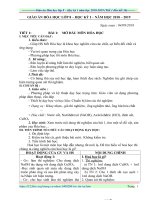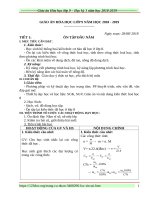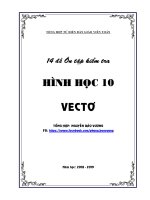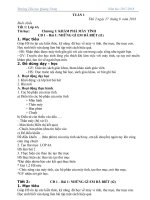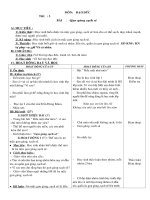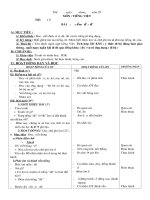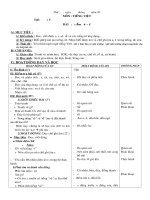Final english 1 ehqt hk1 2018 2019 key 002
Bạn đang xem bản rút gọn của tài liệu. Xem và tải ngay bản đầy đủ của tài liệu tại đây (589.98 KB, 10 trang )
<span class="text_page_counter">Trang 1</span><div class="page_container" data-page="1">
<small>HCMC UNIVERSITY OF TECHNOLOGY & EDUCATION </small>
<b><small>FACULTY OF HIGH QUALITY TRAINING </small></b>
<b>FINAL TEST OF ENGLISH 1 (EHQT130137) </b>
TERM I – SCHOOL YEAR: 2018-2019 Date of test: 04/01/2019
The paper has 60 questions, on 10 pages. Duration: 60 minutes.
<b> Paper code: EHQT_002 No materials are allowed. </b>
Invigilator 1 Invigilator 2
<b>Converted score Converted score </b>
<b>Student’s name: ... Student ID No.: ... Ordinal No.: ... Room: ... </b>
<b>Hướng dẫn đánh trắc nghiệm: </b>
<b>ANSWER SHEET </b>
<b>1 2 3 4 5 6 7 8 9 10 11 12 13 14 15 16 17 18 19 20 A </b>
<b>B C D </b>
<b>21 22 23 24 25 26 27 28 29 30 31 32 33 34 35 36 37 38 39 40 A </b>
<b>B C D </b>
<b>41 42 43 44 45 46 47 48 49 50 51 52 53 54 55 56 57 58 59 60 A </b>
<b>B C D </b>
</div><span class="text_page_counter">Trang 3</span><div class="page_container" data-page="3"><b>PART 1: INCOMPLETE SENTENCES There are 30 questions in this part </b>
<i><b>A word or phrase is missing in each of the sentences below. Four answer choices are given below each sentence. Select the best answer to complete the sentence. Then mark the letter A, B, C, or D on your answer sheet. </b></i>
<b>1. When she is faced with a problem, Cathy Williams always tries to solve --- without asking for any </b>
help from others.
<b>2. The Queen‟s face was on the Canadian twenty-dollar---. </b>
<b>3. All the food in the restaurant was---. I loved it. </b>
<b>4. </b> The part of the face below the mouth is called the---.
A. chin B. nose C. cheek D. forehead
<b>5. </b> Anna is my new teacher. --- long dark hair and blue eyes.
A. There is B. She‟s got C. She is D. She is got
<b>6. --- the storm, the ship couldn't reach its destination on time. </b>
<b>7. Millions of tourists who --- Paris every year spend a lot of money in this city. </b>
<b>8. Go --- this street because it's on the other side of the road! </b>
<b>9. 58% of the population --- English as their first language. </b>
<b>10. 2.5 billion people in the world --- the Internet and 5 billion people have mobile -phone. </b>
<b>11. We have kabsa for dinner tonight. Can you get a --- of rice at the market? </b>
<b>12. A: How --- does your hair generally grow in a month? </b>
B: About 1cm.
<b>13. These --- zones are areas for people, bicycles and public transport only. </b>
<b>14. The city center is very nosy with hundreds of cars, buses and taxis, but there are also a lot of --- </b>
parks with free music concerts.
<b>15. Bourke Street is --- because there are lots of great shops and no cars. </b>
<b>16. He has an office, but he prefers working in the pyramids with other---. </b>
A. archaeology B. archaeological C. archaeologies D. archaeologists
</div><span class="text_page_counter">Trang 4</span><div class="page_container" data-page="4"><b>17. Spain isn‟t a big country, but there are over four hundred million Spanish --- in different </b>
countries around the world.
<b>18. Which of the following is not correct? </b>
A. Do yoga B. Do Tae Kwon Do C. Do online shopping D. Do computer games
<b>19. I‟m really --- to hear about your trip. Tell me all about it! </b>
A. exciting B. excited C. bored D. boring
<b>20. Usually Tom --- work at 5:00, but today he --- until 6:00 to earn some extra money. </b>
A. finishes / is working B. finishes / works
C. is finishing / works D. is finishing / is working
<b>21. Which of the following is a winter sport? </b>
<b>22. “Do you drink coffee?” “Yes, but not---.” </b>
<b>23. </b>Every year many animals ---long distances to find food and water.
A. journey B. trip C. travel D. voyage
<b>24. </b>Carl often asks readers to contact him on his homepage to ask a question about his trips or to leave a ---on his articles.
A. website B. blog C. download D. comment
<b>25. Which of the following is not an extreme sport? </b>
<b>PART 2: INCOMPLETE TEXTS There are 6 questions in this part </b>
<i><b>Read the texts on the following pages. A word or phrase is missing in some of the sentences. Four answer choices are given below each of these sentences. Select the best answer to complete the text. Then mark the letter A, B, C, or D on your answer sheet. </b></i>
<b>Questions 26 through 30 refer to the following email. </b>
Last weekend, I had a day trip to the countryside with some of my classmates. We (26) --- to visit a farm on which Peter‟s Uncle Tom worked.
We left early in the morning and went there by bus. Uncle Tom and some workers met us at the bus stop and (27) --- us to their farm. On the way, Uncle Tom showed us fields of wheat, corn, and vegetables where some tractors were running up and down, plowing and breaking soil, distributing manure and planting seeds. After lunch, we all went for a walk round the (28) ---. In the large yard of the farm, we saw a lot of farming machinery. (29) ---, we went to a cattle farm. A lot of animals like, horses, sheep and cows were raised here. When we came, they were having their dinner.
In the evening, after having an excellent meal, we said goodbye and went home. It was a/an (30) --- day.
</div><span class="text_page_counter">Trang 5</span><div class="page_container" data-page="5"><b>26. A. go </b> B. went C. are going D. have gone
<b>29. A. In the early morning. B. In the late afternoon C. In the late evening </b> D. At night
<b>PART 3: READING COMPREHENSION There are 30 questions in this part </b>
<i><b>In this part of the test, you will read a selection of texts, such as magazine and newspaper articles, letters, and advertisements. Each text is followed by several questions. Select the best answer for each question and mark the letter A, B, C. or D. on your answer sheet. </b></i>
<i><b>Questions 31-35 refer to the following article </b></i>
The Asian Games takes place every four years. The spirit of the Asian Games has been built up over a long period of time, spreading the messages of unity, warmth, and friendship through competitive sport. It helps to establish the relationships among individual athletes, coaches, trainers, officials, volunteers and spectators who come together from many different backgrounds and cultures.
Just 11 countries and regions with 489 athletes participated in the 1st Asian Games in New Delhi in 1951, with only six sports. The 15th Asian Games took place from December 1st through December 15th, 2006, in Doha, the capital of Qatar. More than 10,000 athletes, who represented 45 countries and regions, took part in 39 sports and 424 events of the games. Some new events such as chess and triathlon were also included in the Games.
The world records came in shooting and weightlifting with the Asian bests in archery, athletics, track cycling, shooting, swimming and weightlifting. The 15th Asian Games Doha 2006 truly has been the Games of Your Life for all.
<b>31. What messages do the Asian Games spread? </b>
A. unity and warmth B. unity and friendship
C. warmth and friendship D. unity, warmth and friendship
<b>32. How many countries took part in the first Asian Games? </b>
A. ten countries B. less than ten countries
<b>35. How many games and events were organized at the 15th Asian Games? </b>
A. 39 sports and 424 events B. 424 sports and events C. 346 sports and events D. 634 sports and events
</div><span class="text_page_counter">Trang 6</span><div class="page_container" data-page="6"><i><b>Questions 36-42 refer to the following letter. </b></i>
Hi Emily
I‟m really sorry but don‟t have time to visit you so I‟m writing this email instead. Last night I went to the cinema and saw a great film. You can also read the book – and I heard on the radio that it‟s a true story. It‟s about a family with three children, two boys and a girl, who lived in a village in India. The children went to school there and had lots of friends. When the children grew up, they started thinking about moving abroad. The sister went to France to become a teacher. The older brother went to America to open a restaurant, only the younger brother stayed in their home country and worked on his father‟s farm. He worked really hard but he was happy.
When they grew up, they all got married and had lots of children. The film shows us the good and sad times the three families had and how the brothers and sister didn‟t see each other for ages. Their children, who were cousins never met when they were little. Many years later, when the sister became a grandmother, she decided to see her brothers again and meet their wives and children, so she invited them all to her big house in France.
I‟m not going to tell you what happens in the end because I want you to see it yourself. I also have the book which I‟m reading now, but I think the film is better. I would like to see it again so you can come with me and my sister on Saturday. I‟m sure you will love it when you see it. It‟s a little bit sad, but not all the time. Sometimes I laughed and sometimes I cried, but I can‟t say if the film is funny or sad.
I hope to see you next week. Talk soon. Love,
Rachel
<b>36. What did Rachel do yesterday? </b>
A. She watched a movie. B. She read a book. C. She listened to a story. D. She met her siblings.
<b>37. Rachel says the story‟s about---. </b>
A. three children‟s schooldays. B. two brothers and a sister.
C. a boy and his family. D. a grandma and a granddaughter.
<b>38. Where is the father‟s farm? </b>
<b>39. Who doesn‟t leave their country? </b>
A. The older boy B. The younger boy C. The girl D. The grandma
<b>40. Who arranged the visit to France? </b>
A. The brothers B. The wives C. The sister D. The brother
<b>41. Rachel thinks---. </b>
A. Emily should watch the film. B. Emily will prefer the book.
C. Emily will want to see it again. D. Emily will prefer the film version.
<b>42. Overall, this article is ---. </b>
</div><span class="text_page_counter">Trang 7</span><div class="page_container" data-page="7"><i><b>Questions 43-47 refer to the following article </b></i>
<b>BODY LANGUAGE AND CULTURAL DIFFERENCES </b>
The body language people use often communicates more about their feelings than the words they are saying. We use body movements, hand gestures, facial expressions, and changes in our voice to communicate with each other. Although some body language is universal, many gestures are culturally specific and may mean different things in different countries.
If you want to give someone the nod in Bulgaria, you have to nod your head to say no and shake it to say yes – the exact opposite of what we do! In Belgium, pointing with your index finger or snapping your fingers at someone is very rude. In France, you shouldn‟t rest your feet on tables or chairs.
Speaking to someone with your hands in your pockets will only make matters worse. In the Middle
<b>East, you should never show the soles of your feet or shoes to others as it will be seen as a grave insult. </b>
When eating, only use your right hand because they use their left hands when going to the bathroom. In Bangladesh, the „thumbs-up‟ is a rude sign. In Myanmar, people greet each other by clapping, and in India, whistling in public is considered rude. In Japan, you should not blow your nose in public, but you can burp at the end of a meal to show that you have enjoyed it. The „OK‟ sign (thumb and index finger forming a circle) means „everything is good‟ in the West, but in China it means nothing or zero. In Japan, it means money, and in the Middle East, it is a rude gesture.
<b>43. It is mentioned in the passage that many gestures ---. </b>
A. may mean different things in different countries. B. are not used to communicate our feelings. C. can be used to greet each other in public. D. are used in greeting among men and women.
<b>44. People nod their head to say no in ---. </b>
<b>45. In the Middle East, people do not use their left hands for eating because they use their left hands </b>
---.
A. when preparing the meal B. when going to the bathroom
C. to put in their pockets D. to clean their tables and chairs
<b>46. Which of the following is NOT true according to the passage? </b>
A. In France, people shouldn‟t rest their feet on tables.
B. In Belgium, snapping your fingers at someone is very rude. C. In China, the „OK‟ sign means money.
D. In Myanmar, people greet each other by clapping.
<b>47. The word “others” in paragraph 3 refers to other ---. </b>
</div><span class="text_page_counter">Trang 8</span><div class="page_container" data-page="8"><i><b>Questions 48-54 refer to the following article </b></i>
<b>Peter Goes Shopping </b>
One day Peter went to town to buy new clothes. First, he tried on a pair of trousers. He didn't like the trousers, so he gave them back to the shopkeeper. Then he tried a robe which had the same price as the trousers. Peter was pleased with the robe, and he left the shop. Before he climbed on his donkey to ride home, the shopkeeper and the shop-assistant ran out.
"You didn't pay for the robe!" said the shopkeeper.
"But I gave you the trousers in exchange for the robe, didn't I?" replied Peter. "Yes, but you didn't pay for the trousers, either!" said the shopkeeper.
"But I didn't buy the trousers," replied Peter. "I am not so stupid as to pay for something which I never bought."
<b>48. How did Peter get to the shop? </b>
A. on foot B. by camel C. by donkey D. the story doesn't say
<b>49. What did Peter do first in the shop? </b>
A. He tried on some trousers. B. He tried on a robe.
C. He tried on a hat D. He greeted the shopkeeper.
<b>50. What did Peter try on next? </b>
A. A robe B. A pair of trousers C. A hat D. A pair of shoes
<b>51. Which item did Peter like best? </b>
A. The robe B. The hat C. The trousers D. The shorts
<b>52. How many people were working in the shop? </b>
<b>53. Why was the shopkeeper angry when Peter left? </b>
A. He didn't take the trousers. B. He didn't pay for the robe. C. He didn't say goodbye. D. He didn‟t give enough money.
<b>54. What did Peter actually pay for? </b>
A. nothing B. the robe C. the trousers D. the hat
<i><b>Questions 55-60 refer to the following article </b></i>
Computer programmer David Jones earns £35,000 a year designing new computer games, yet he cannot find a bank prepared to let him have a cheque card. Instead, he has been told to wait another two years, until he is 18. The 16-year-old works for a small firm in Liverpool, where the problem of youngest people of his age is finding a job. David's firm releases two new games for the expanding home computer market each month. But David's biggest headache is what to do with his money. Despite his salary, earned by inventing new programs within tight schedules, with bonus payments and profit-sharing, he cannot drive a car, take out a mortgage, or obtain credit cards. He lives with his parents in their council
</div><span class="text_page_counter">Trang 9</span><div class="page_container" data-page="9">house in Liverpool, where his father is a bus driver. His company has to pay £150 a month in taxi fares to get him the five miles to work and back every day because David cannot drive.
David got his job with the Liverpool-based company four months ago, a year after leaving school with six O-levels and working for a time in a computer shop. "I got the job because the people who run the firm knew 1 had already written some programs," he said. "I suppose £35,000 sounds a lot but actually that's being pessimistic. I hope it will come to more than that this year." He spends some of his money on records and clothes, and gives his mother £20 a week. But most his spare time is spent working. "Unfortunately, computing was not part of our studies at school," he said. "But 1 had been studying it in books and 'magazines for four years in my spare time. 1 knew what 1 wanted to do and never considered staying on at school. Most people in this business are fairly young, anyway." David added: "I would like to earn a million and 1 suppose early retirement is a possibility. You never know when the market might disappear."
<b>55. Why is David different from other young people at his age? </b>
A. He earns an extremely high salary. B. He lives at home with his parents. C. He does not go out much. D. He is not unemployed.
<b>56. David's greatest problem is ---. </b>
C. inventing computer games. D. making the banks treat him as an adult.
<b>57. He was employed by the company because ---. </b>
A. he works very hard. B. he had written some computer programs. C. he had worked in a computer shop. D. he had learnt to use computers at school.
<b>58. He left school after taking O-levels because ---. </b>
A. he was afraid of getting too old to start computing. B. he did not enjoy school.
C. he wanted to earn a lot of money.
D. he wanted to work with computers and staying at school did not help him.
<b>59. Why does David think he might retire early? </b>
A. He wants to stop working when he is a millionaire. B. You have to be young to write computer programs. C. He thinks his firm might go bankrupt.
D. He thinks computer games might not always sell so well.
<b>60. The word " pessimistic " in the reading passage probably means---. </b>
<b>--- THIS IS THE END OF THE TEST --- </b>
</div><span class="text_page_counter">Trang 10</span><div class="page_container" data-page="10"><b>Chuẩn đầu ra của học phần (về kiến thức) Nội dung kiểm tra </b>
[CĐR 1.1]: Lựa chọn chính xác các thì và cấu trúc cơ bản trong tiếng Anh. Câu 1-30 [CĐR1.2]: Tái hiện kiến thức ngôn ngữ cơ bản về từ vựng để giao tiếp
trong các tình huống đơn giản.
Câu 1-30 [CĐR 1.3]: Thể hiện kiến thức cơ bản về văn hóa giao tiếp trong các tình
[CĐR 2.2]: Có khả năng đọc hiểu các đoạn văn ngắn, mẩu tin ngắn, bảng khảo sát.
Câu 30-60
<i>Ghi chú: Cán bộ coi thi không được giải thích đề thi. </i>
<b>Ngày 28 tháng 12 năm 2018 h ng ua trư ng ng nh </b>
<b> h.S Lê Phương Anh </b>
</div>
